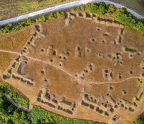
Rugby has played an important role in Dame Hinewehi Mohi’s life, and not just for that day at Twickenham during the 1999 Rugby World Cup, when she famously sang God Defend New Zealand in te reo Māori.
“My father was a good rugby player and he played for Pōrangahau and the Te Poho o Kahungunu marae team in rural Hawke’s Bay,” says Mohi (Ngāti Kahungunu, Ngāi Tūhoe). “He was also their coach and captain, so when they travelled to games outside the district, if they went to another marae, Dad would be pushed up the front to speak. Only, he was from that generation that hadn’t been taught te reo Māori, whose parents thought their children were better off focusing on English.”
Which is why, in the mid-1970s, Mike Mohi started learning te reo Māori, not only out of a sense of responsibility to his rugby team, but also to his whānau and hapū. “I was about 10 when Dad signed up for a correspondence course. Us kids grudgingly learned with him, although I’d rather have been outside on the farm, playing with the animals or riding motorbikes.”
Today, New Zealanders can mihi to Mike Mohi for his gentle insistence that Hinewehi and her two sisters learn their language. Having travelled a long road from that Pōrangahau farm, she is now widely acknowledged as the woman who helped merge te reo Māori with commercial music, working with contemporary artists to oversee the translation






